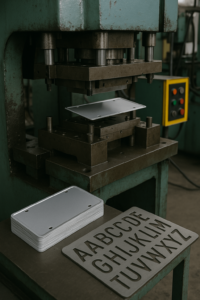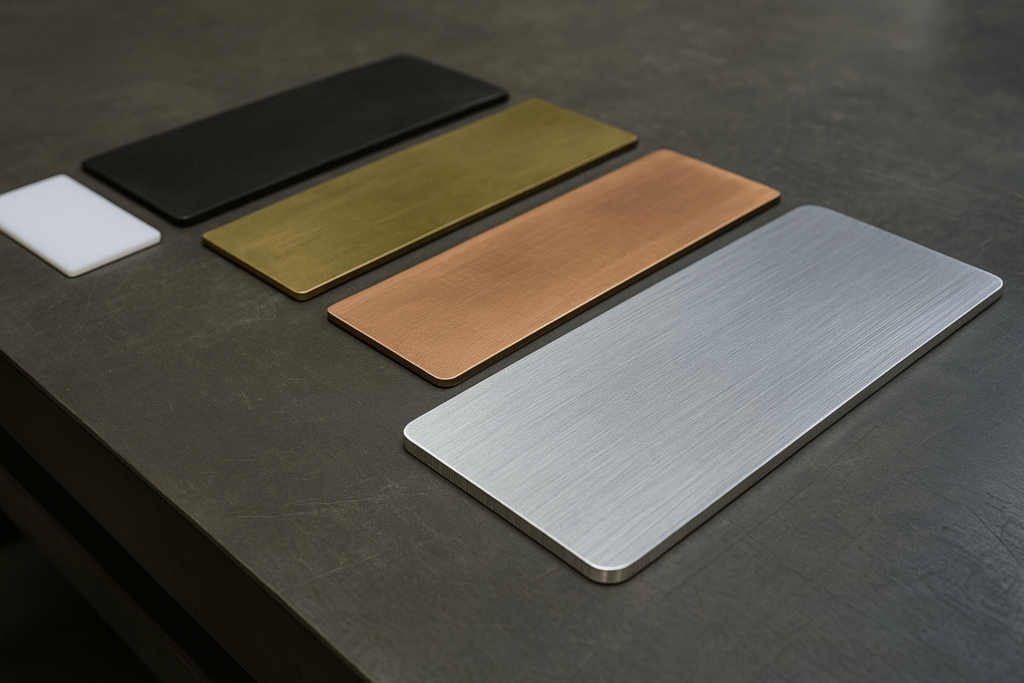For a procurement manager, sourcing custom metal components requires constant risk management—balancing specifications, tolerances, and quality. A seemingly simple custom license plate provides a powerful case study in the precision, expertise, and robust processes essential for high-quality custom fabrication. It clearly demonstrates how raw material transforms into a durable, compliant, and aesthetically precise finished product tailored to both regulatory and commercial requirements.
This article deconstructs the personalized license plate from an industrial engineering perspective. As a metal fabrication facility with over 26 years of hands-on experience, we’ve learned that the real story lies in meticulous manufacturing decisions and material management processes. In the following sections, we detail the material science, the manufacturing blueprint, and the quality systems that underpin a durable metal product—offering actionable insights for any wholesale buyer managing the procurement of custom parts like license plates. Whether you’re sourcing for government fleet requirements, promotional branding needs, or made-to-order aluminum signage, understanding the manufacturing foundation is crucial to long-term success.
The Anatomy of a Plate: A Foundation of Material Science and Compliance
In B2B sourcing, product viability rests on two pillars: material integrity and standards compliance. Before any design work begins, the physical foundation of a component must be engineered for its intended application and operating environment. Therefore, this section dissects the technical reasoning behind material selection—a critical factor in mitigating risk for any large-scale order of custom license plates.
The Material Science of a Street-Legal Plate: Why Aluminum Alloy is the Professional’s Choice
The primary question, what are license plates made of?, dictates durability, bulk pricing, and scalability. Typically, the industry standard is not just any metal, but a specific grade of aluminum alloy—usually from the 3xxx or 5xxx series (e.g., 3105 or 5052). This is a strategic engineering decision rooted in both performance and economics.
Aluminum’s primary advantage in license plate material is its intrinsic corrosion resistance. Our experience confirms that while steel needs flawless coatings to prevent rust, aluminum alloys naturally form a self-healing oxide layer. This passivation protects the metal from road salt and moisture, thereby ensuring brand integrity and long-term product performance—an essential consideration for products bearing a corporate logo or regional identifier.
When it comes to mass production, manufacturability becomes paramount. Aluminum’s excellent formability allows for high-speed, repeatable stamping results, ensuring tight tolerance control across thousands of units. The following table provides a technical comparison relevant to a sourcing decision for license plates and high-volume manufacturing:
| Feature | Aluminum (5052 Alloy) | Steel (Low-Carbon) | Plastic (ABS/Acrylic) | Brass |
|---|---|---|---|---|
| Corrosion Resistance | Excellent (self-passivating) | Poor (requires robust coating) | Excellent | Good (tarnishes) |
| Durability & Impact | Good (high ductility) | Excellent (high tensile strength) | Fair (can be brittle) | Fair (soft, dents easily) |
| Weight | Very Light | Heavy | Very Light | Very Heavy |
| Manufacturing Efficiency | Excellent for high-speed stamping | Good, but requires more tonnage | Poor for embossing | Inefficient for stamping |
| Cost-Effectiveness (Bulk) | Excellent | Good | Fair | Poor |
| Typical Application | Official Plates, Premium Signage | Structural Components | Novelty Items, Displays | Decorative |
Decoding the Types: A Guide to Product Classification for Sourcing
Understanding product classification is vital. The term “custom plate” can refer to vastly different products. Misclassification could lead to sourcing an item unfit for its intended market or application. Below is a sourcing-focused overview of major categories:
- Official Registration Plates (Vanity Plates): These are highly regulated and require strict compliance with government standards regarding reflectivity, size, embossing, and traceability.
- Specialty & Promotional Plates: A major commercial category, often bearing corporate logos for fleet vehicles. These demand high aesthetic quality and precise color matching (e.g., Pantone), which is especially important for brand consistency across a large rollout.
- Novelty Plates / Private Label Car Tags: These decorative custom car tags are typically sold as merchandise. Sourcing these requires cost-effective production without sacrificing visual quality or shelf appeal. These are commonly found in the automotive aftermarket, tourism retail, and seasonal campaigns.
Design & Engineering: Considerations for High-Volume Customization
For wholesale buyers, design concerns both effective branding and manufacturability. A custom metal plate for a commercial client should always be approached with an engineering mindset to ensure that the final product is brand-accurate and optimized for production-scale economics.
From Concept to Production-Ready: DFM Principles for Custom Plates
A great design can fail in production if it ignores manufacturing limitations. This is where Design for Manufacturability (DFM) principles come in. By following DFM, we help clients avoid costly tooling rework in OEM manufacturing and ensure optimal output yield.
- Font Legibility: Thin or ornate embossed fonts may lead to material stress or breakage. We recommend minimum stroke widths based on material thickness to ensure consistent quality in mass production.
- Color Matching & Finishing: Brand consistency is key. Our process includes matching to Pantone codes and advising on the most durable finish options to maintain color fidelity under real-world conditions.
- Embossing Depth & Tooling: The depth of embossed elements must balance visual impact with material integrity. Investing in a precision-machined die is essential for long-term consistency and scalable cost-efficiency. In addition, die maintenance and revision control are crucial in sustaining quality across large runs.
The Manufacturing Blueprint: A Transparent Look into Our Production Process
A reliable supplier must provide full transparency into their production capabilities. The following outlines our industrial workflow for manufacturing custom plates, illustrating key stages where quality and efficiency are designed to meet international B2B standards. For buyers seeking high-volume license plate manufacturing, this level of insight is critical.
Step 1: Pre-Production – The Digital Approval and Tooling Phase
First, a rigorous pre-production phase ensures the product meets exact specifications. Our engineers thoroughly review each client design for DFM compliance with license plate standards.
Next, we send a digital proof for final approval. Once signed off, the order proceeds to tooling. For embossed designs, a custom tool and die set is precision-machined from hardened steel using CNC. For high-frequency orders, we discuss die life-cycle projections and backup tooling options to support continuity.
Step 2: Production – The Core Manufacturing Stages
Then, the journey from aluminum coil to finished plate moves through several core custom fabrication processes:
- Blanking: A high-speed press feeds the aluminum coil and blanks rectangular shapes to specified dimensions.
- Stamping & Embossing: Our stamping press applies controlled tonnage to emboss design elements—such as numbers, letters, or branding—onto each blank. The preset die defines depth, font stroke, and spacing.
- Finishing & Printing: After that, plates move to the finishing department for background sheeting, precision ink application, or multi-color digital printing. Depending on the export region, we may apply UV-coating or anti-fade treatments.

Step 3: Post-Production – Quality Control and Packaging
Finally, every plate undergoes a visual inspection. We perform statistical sampling from each batch and conduct dimensional checks to ensure alignment with client specifications. To minimize transit risk, we package products in multi-layered, moisture-resistant materials. For clients with strict inventory systems, we also offer custom labeling, batch tracking, and palletization services.
Beyond the Product: Quality Assurance, Global Logistics & Partnership
For overseas buyers, the product is only part of the equation. A supplier’s quality assurance systems and international logistics capabilities are just as critical. A true manufacturing partner ensures reliability and mitigates risks from order to delivery.
Our Commitment to Quality: A Multi-Point Inspection Process
At YISHANG, quality control is a continuous cycle of verification—not a final checkbox. Our system includes:
- Raw Material Inspection: We verify material certificates to confirm alloy grade and traceability requirements.
- In-Process Checks: Our operators conduct real-time checks during stamping and coating to detect deviations early.
- Final Batch Audits: Our QC team performs comprehensive inspections, in alignment with our ISO 9001 certification and your specified tolerances.
In addition, we offer documentation packages, including inspection protocols, test reports, and traceability records—available on request.
Global Logistics and Supply Chain Reliability
We recognize the pressures of today’s global supply chain. With shipments to over 50 countries, our logistics team manages the process from factory to port. We provide full documentation, customs coordination, and real-time tracking. For clients sourcing bulk custom license plates, we support carton optimization and just-in-time delivery for multi-location distribution.
Conclusion: Your Strategic Partner for Custom Metal Fabrication
Choosing a supplier is a strategic decision that influences brand quality, cost structure, and lead times. The manufacturing of a custom license plate reveals the depth of engineering, material science, and process control required for successful metal fabrication.
Ultimately, it highlights a manufacturer’s ability to deliver precision and consistency in high-volume production. When selecting a supplier, evaluate not only technical capabilities but also their quality systems and scalability. A vendor offering deep insight and industrial flexibility becomes a long-term partner.
To discuss your project’s needs or to submit an RFQ, feel free to contact our engineering team. Our experts are ready to support your made-to-order aluminum signage, promotional tags, or registration plate programs with precision, efficiency, and professionalism.


